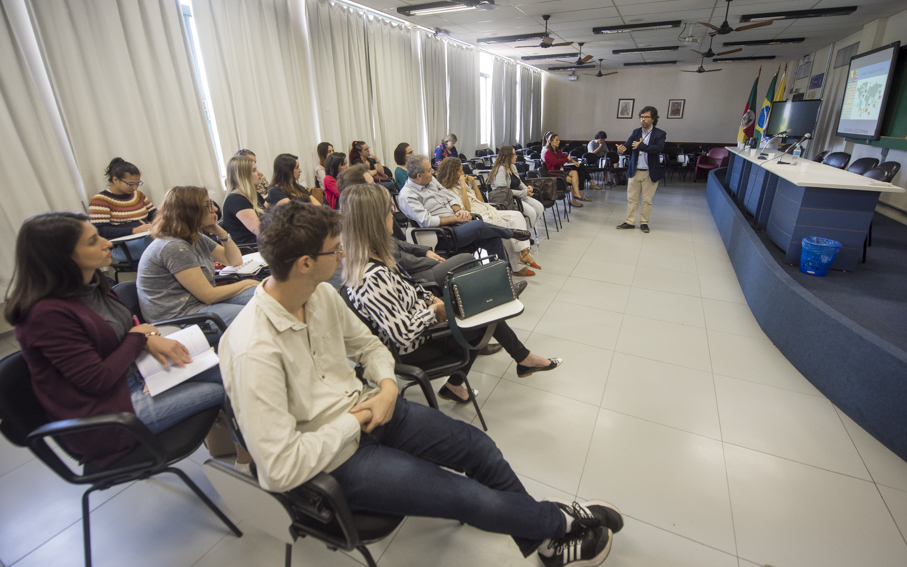Historical and linguistic context addressed in event's first roundtable
PUCRS opened its doors to the 1st International Seminar of Portuguese Language Studies, on Nov 19 – 20, to discuss the common linguistic and cultural traits shared by Portuguese language speakers from all over the globe. Promoted by the School of Humanities’ , Graduate Programs in History and Letters, the event featured the Vice Consul of Portugal for Porto Alegre, Adriana de Melo Ribeiro, and the president of the Conselho Regional do Conselho das Comunidades Portuguesas (Regional Board of the Council of Portuguese Communities) (CCP) for Central and South America, Antonio David.
The opening ceremony also featured the Vice President of Extension and Community Affairs, Dr Marcelo Bonhemberger, who stressed the relevance of cross-sectional and multidisciplinary work in graduate programs, and the relevance of cultural integration. The Dean of the School of Humanities, Dr Regina Kohlrausch, also made her presence felt. In the view of the Vice Consul of Portugal for Porto Alegre, the universe of Portuguese-speaking countries is fascinating. “It’s quite an enriching experience to study the influence that the Portuguese people had on the four corners of the world, as we tried to establish a connection with other nations”, commented she.
Historical distribution of the Portuguese language
 At the first roundtable of the event, Dr Marçal de Menezes Paredes, professor of the Graduate Program in History, presented an overview of the 700 years of Portuguese language. He discussed the difficulty Brazilians face in trying to understand the Portuguese accent, but reinforced the richness and importance of the language over the course of its history. The way Paredes sees it, revisiting the Portuguese culture is the tool for the internationalization of the imaginary of Brazilians. He made mention to the hybridization of cultures over the centuries as important factors for the language that we now use, as it incorporated the histories and heritage of several parts of the world.
At the first roundtable of the event, Dr Marçal de Menezes Paredes, professor of the Graduate Program in History, presented an overview of the 700 years of Portuguese language. He discussed the difficulty Brazilians face in trying to understand the Portuguese accent, but reinforced the richness and importance of the language over the course of its history. The way Paredes sees it, revisiting the Portuguese culture is the tool for the internationalization of the imaginary of Brazilians. He made mention to the hybridization of cultures over the centuries as important factors for the language that we now use, as it incorporated the histories and heritage of several parts of the world.
In addition to the cultural traits, Paredes discussed large-scale historical events that changed the language. “To study the history and culture of Portuguese-language speaking countries is to navigate across European, African and Latin American studies”, added he.
The linguistic context of Portuguese language
Dr Cristina Perna, professor of the Graduate Program in Letters joined the first roundtable as she discussed the Portuguese language under a linguistic perspective. The language is spoken in six continents, 11 countries and is the 6th most spoken language on the planet. Cristina talked about the teaching of Portuguese as an additional language as she addressed language policies designed to meet the needs of students in terms of academic mobility.
She also presented a project that includes Portuguese classes for Haitian migrants, which has resulted from the partnership between the School of humanities, the Pastoral and Solidarity Center and the Santa Clara Parish. At the end, she talked about the teaching of Portuguese as an additional language at the graduate level, known as Ensino de Português para Fins Acadêmicos (Teaching of Portuguese for Academic Purposes) – PPEA, which also addresses the production of theory, formal presentations and research.